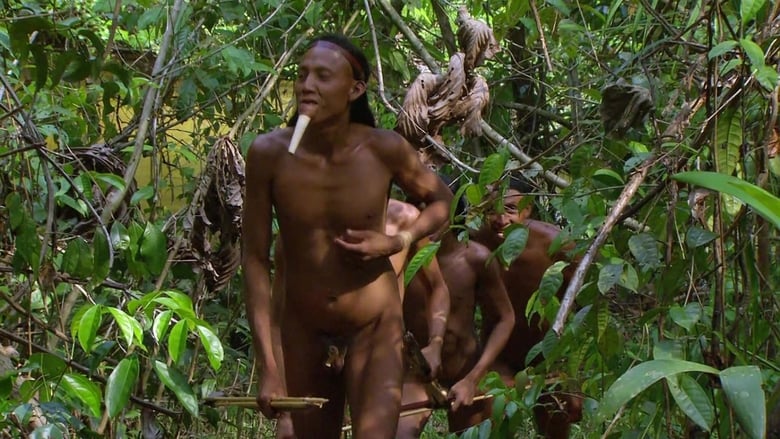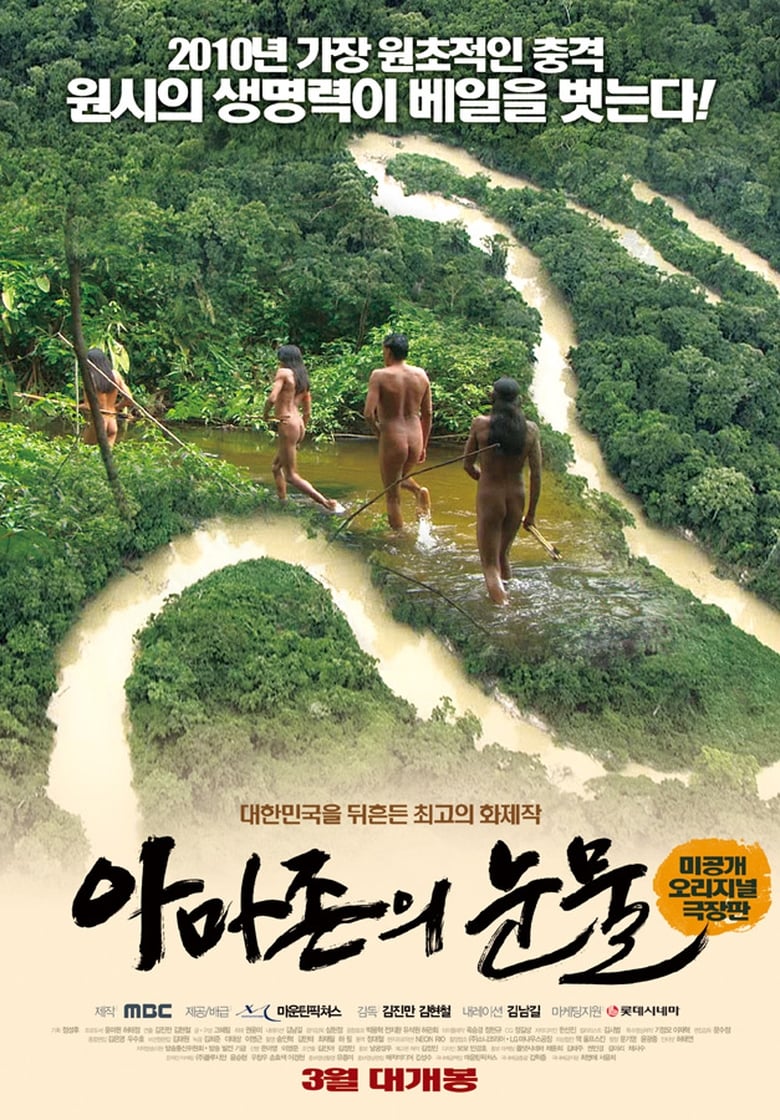Loading


Tears in the Amazon
Genres
Documentary
Overview
A documentary about environment destruction in the Amazon and the tribes living there. Produced for the 48th anniversary of MBC, Korea. A brilliant records of the itinerary for 250 days through the Amazon.
Details
Budget
$0
Revenue
$0
Runtime
98 min
Release Date
2010-03-25
Status
Released
Original Language
Korean
Vote Count
4
Vote Average
7.8
Cast
Meet the talented actors who bring the movie to life.
Kim Nam-gil
Self - Narrator
Similar Movies
Explore movies similar to this one that you might also enjoy.
4.0
A Global Warning?
Global warming in context. What the climate of the past tells us about the climate of the future.
2007-11-11 | en
0.0
Alien Sharks: Return To The Abyss
| fr
0.0
The Adventures of a Blue Fly
This film was produced as an extension of a research film on the metamorphosis of the fly. It successively shows the hatching of the eggs, the nutrition and growth of the larvae, swarming and underground penetration, the formation of the pupa, metamorphosis and organization of the adult insect.
1954-01-01 | fr
0.0
A Weaverly Path: The Tapestry Life of Silvia Heyden
A Weaverly Path offers an intimate portrait of Swiss-born tapestry weaver Silvia Heyden. The film captures the inner dialogue and meditations of an extraordinary artist in the moments of creation. Heyden works for over a year to create works inspired by the Eno River in Durham, North Carolina. And she shares how nature, music, her Bauhaus inspired education at the School of the Arts in Zurich and her life experiences anchor and inform her art. Heyden was a 20th century modernist whose body of work redefines the art of modern tapestry.
| en
0.0
Volavky na Velkém Tisém
1951-01-01 | cs
0.0
The Rabbits of Skomer
Wild rabbits share the sea cliffs on the island of Skomer, off the Pembrokeshire coast, with seabirds like puffins and seagulls. They come in many shades, owing to their intriguing history, and each spring the island of Skomer itself is transformed by wild flowers, creating one of Britain's most beautiful natural spectacles. The green and brown island turns blue and pink for a couple of spectacular weeks under a carpet of bluebells and red campion.
2006-06-25 | en
0.0
The Owls and the Orchard
A devoted pair of little owls set up home in an old orchard in rural Herefordshire. From spring blossom to autumn apples, a year in the life of the parent birds, their baby owls and the old fruit trees.
2005-11-23 | en
0.0
West Coast Otters
Two otters, a mother and daughter, are inseparable as the cub faces the dangers of her first Scottish winter, and Mum works hard to ensure both survive. Never more than a few feet apart, cub and mum exhibit a very special relationship as the cub grows up, learning how to fish and fend for herself on the idyllic west coast of Scotland.
2005-10-19 | en
9.0
High Life at Low Temperatures
The summits and sheer mountain ridges of Austria’s "Little Siberia" funnel the freezing air from snow-covered peaks into a gigantic hollow – a high-level plateau at 1,000 metres from which it cannot escape: Lungau is Austria’s coldest region. Creeks and streams start higher here, and create bogs, moors and countless alpine lakes. Summer is short but lively, as eagles rear their precious young and ermines eat their fill before the sparse winter returns, while black alpine salamanders give birth to live miniature versions of themselves beneath the tree-line.
2017-01-01 | de
0.0
Eye of the Pangolin
Eye of the Pangolin is the story of two men on a mission to get all four species of African pangolin on camera for the very first time. As they travel the continent to learn more about those caring for and studying pangolins they are captivated by these strange, secretive creatures and document the race to save them from being poached to extinction. The film was released Endangered Species Day in May 2019 and our goal is to make it the most watched wildlife documentary ever. Therefore we've made it freely available as an open source documentary, accessible for viewing by millions of people around the world via YouTube, through educational establishments and at screenings supported by international conservation organisations everywhere.
2019-05-17 | en
7.8
Under the Cold Stars
Set in the mountains of northeast Italy, this film may be considered an observational documentary about rural life. Although this is undeniably the case, at the same time Under the cold stars can hardly be considered a documentary: the microcosm on which it focuses appears to be a reflection of a broader reality and perhaps a way to deal with the themes of man’s existence and his relationship with animals, nature and, most importantly, with time. As written by Franco Piavoli "it is a film which essentially relies on images and sound, where words themselves are sound and the music of life, of the relentless flow of time."
2020-09-06 | it
0.0
Na ptačích horách
1949-01-01 | cs
5.3
Shark Gangs
Scientists have discovered and investigate the reason behind the behavior of sharks swimming around in gangs even though they are viewed as solitary predators.
2021-07-16 | en
7.5
The Truffle Hunters
In the secret forests of Northern Italy, a dwindling group of joyful old men and their faithful dogs search for the world’s most expensive ingredient, the white Alba truffle. Their stories form a real-life fairy tale that celebrates human passion in a fragile land that seems forgotten in time.
2020-12-25 | it
7.9
Koyaanisqatsi
Takes us to locations all around the US and shows us the heavy toll that modern technology is having on humans and the earth. The visual tone poem contains neither dialogue nor a vocalized narration: its tone is set by the juxtaposition of images and the exceptional music by Philip Glass.
1983-04-27 | en
7.0
Woven Songs of the Amazon
The Shipibo-Konibo people of Peruvian Amazon decorate their pottery, jewelry, textiles, and body art with complex geometric patterns called kené. These patterns also have corresponding songs, called icaros, which are integral to the Shipibo way of life. This documentary explores these unique art forms, and one Shipibo family's efforts to safeguard the tradition.
2007-01-01 | en
10.0
River of Grass
An ode to the Florida Everglades, past and present, told through the prescient writings of Marjory Stoneman Douglas and those who today call the region home.
2025-10-17 | en
0.0
Reindeer Family & Me
Wildlife cameraman Gordon Buchanan travels to the frozen north, deep inside the Arctic Circle, to meet the ancient Sami people and the animals they hold so close - reindeer.
2017-12-26 | en
7.1
The Living Desert
Although first glance reveals little more than stones and sand, the desert is alive. Witness moving rocks, spitting mud pots, gorgeous flowers and the never-ending battle for survival between desert creatures of every shape, size and description.
1953-11-10 | en
5.0
Reflection
Eerie images of landscapes after the Fukushima nuclear disaster shot on black and white 8mm.
2014-01-01 | ja